- Home
- Jana Oliver
Madman's Dance (Time Rovers) Page 38
Madman's Dance (Time Rovers) Read online
Page 38
“Ah, we can’t possibly—” the man began.
“Do it. Now!” The menace in her voice did the trick. They halted in a side street, clearly flustered by her presence.
“Who are you?” she asked.
“Ah, we can’t tell you that,” the man replied nervously.
“Yes, you can,” Cynda countered. “That way, I don’t get nasty about you following my ass all over London.”
She waited for the startled expression at her raw language. Instead, the woman fished a tattered notebook and a short pencil out of a pocket, eyes aglow. “Good heavens, she’s just like they said.”
“Prudence!” the man hissed.
“Oh, this is perfect. I never thought we’d have a chance to talk to a Past.”
“Prudence!” the man hissed again, louder.
Past? The ha’penny dropped. “You’re Futures, aren’t you?” Cynda asked.
The woman nodded enthusiastically.
“Why are you following me?”
“You’re Jacynda Lassiter! I mean, what an opportunity. You’re a legend,” the woman gushed.
Her companion shook his head in dismay. “Before my colleague goes any further, you must forget you saw us.”
“Not likely. So why come from…” Cynda waved her hand to indicate sometime in the future, “to watch me work? I’m good, but not legendary.”
“Well, according to DeMoss, your techniques were responsible for—”
“Pru!” This time the man’s warning worked, and the woman’s lips snapped shut.
Drat. I was so close. “Were you following me the night I stopped the assassin at the party? My interface registered someone, but the readings were inconclusive.”
A cautious nod.
“So why aren’t you registering now?”
“We blocked it.”
“Why didn’t you block it that night?”
The man looked chagrined. “We forgot,” he admitted.
“So where else have you been?” The two traded looks. “Come on!” Cynda cajoled.
The fellow cleared his throat. “In Rotherhithe, near the Spread Eagle and Crown when you attempted to cross the water to Whitechapel; the night you were tossed under the beer wagon, and—”
“Never mind.” Why hadn’t she seen them before? What else was she missing?
After a quick look around, he offered his hand. “I’m Thomas, by the way.”
“Glad to meet you, Thomas.” They shook. “Is your last name Anderson?”
“Ah…no,” he said.
It was worth a try.
“Prudence,” the woman said and giggled.
This was embarrassing. “I’ve never had my very own entourage before,” Cynda remarked. “I really must screw things up.”
Pru became engrossed in the tip of her pencil.
Oh great. “Any tips so I don’t get myself shot, stabbed, or my brain remapped again?”
Silence. At least from the two in the alley. Out on the street, a baked potato vendor called out his wares in a sing-song voice.
“That bad, huh?” she said, growing nervous.
“Not really good,” the man admitted.
“Fate-of-the-whole-world stuff?” Cynda joked.
The man looked at her sharply. She’d hit home without meaning to.
“You’re remarkably calm about all this,” he said.
“Mostly because I don’t have a clue what’s going on. Something’s up. Something bad, but I don’t know what. It would be a great help if you guys could fill me in.”
“You don’t know?” he asked incredulously.
“That’s what I just said,” Cynda shot back.
“That’s not right. By now you should—” He stopped abruptly. “Why is it going wrong?”
“Just a hint would help,” Cynda urged. Please.
Prudence shook her head. “Tampering with history. Can’t do it. Cost us our grant.”
“You have a grant to follow me around? I really must screw things up if you got funding.”
The two Futures traded looks, and then Thomas moved closer. “I would suggest that you take a visit to…” He looked around. “Tomorrow, Lord Mayor’s Day. Anywhere in the East End. Just be careful when you do.”
“Well, I could do with a bit of a holiday,” Cynda mused.
“It won’t be any holiday, that I can tell you.” Thomas pulled out what appeared to be a pocket watch, but it was fatter and a bit more rectangular, like a vintage cigarette case. “It’s clear, Pru. You ready?”
“Wait, you’re leaving?” Cynda said.
“Our time is up for this session.”
“But—”
There was no light, no sound. And no people. Time travel technology had clearly made some awesome improvements.
~••~••~••~
Theo was pacing. She’d never seen him do that before. “Fulham is trying to track down Harter,” he blurted before she could say a word. “He’s having no luck. Klein doesn’t have him, either. No one knows where he is.” He shook his head. “This is so off the rails.”
“Why not go back to the party and catch him?”
“We don’t dare, not in front of that many people,” Morrisey replied. “Too dangerous.”
“How about when they take him to jail?”
“That’s a possibility.”
“Well, if you wait long enough he’ll surface eventually,” she replied.
He gave a grunt of displeasure. “I want him somewhere safe.”
She draped her mantelet over a chair. “There were a couple of people downstairs. They kept staring at me, so I asked a few questions. They say they’re Futures, and from the technology I saw, I don’t think they’re lying.”
“Why are they so interested in you?” Morrisey asked, all attention now.
Because I’m a legend.
“They’ve got a grant to follow me around.” She snorted. “Can you believe that? They said I should know what’s going on by now, and since I don’t, they suggested a trip to tomorrow.”
Morrisey frowned. “Why tomorrow?”
She threw up her hands and headed for the bedroom. If she was off to the East End, she wasn’t wearing her nice dress. As she changed, she realized that she’d have to buy mourning clothes for Adelaide. The steel-gray gown wouldn’t be dark enough for Defoe’s loss.
Cynda returned to the sitting room to find Theo staring into the fire.
She flipped open her interface. “Along for the ride, boss?”
A distracted nod. He pulled out his own interface and began copying her settings.
“It’s a major holiday. The streets will be packed, so make it four in the afternoon,” she said. “Might be less crowded.”
“Really?” he said crossly. “I’ve actually been to a Lord Mayor’s Show. How about you?”
“Yup. In 1789.” She’d lost her interface in the midst of the crowd and when she’d caught up with the thief, he’d already handed it off to an accomplice. She’d gone ugly on him and gotten arrested for assault. Once in jail, an inmate had tried to steal her boots. Nasty memory.
Like most of them.
Chapter 12
Friday, 9 November, 1888
Whitechapel
They’d arrived in Hell.
Cynda’s first gasp was filled with acrid smoke, causing her lungs to spasm. Coughing hard, she flipped the interface closed and buried it inside a deep pocket. Then she crouched low, positioning a handkerchief over her nose and mouth. Around them, flames leapt upward in seething columns and slithered across the ground like hungry lizards.
Someone cried out her name.
A few feet away, Morrisey was on his knees, hand grasping his chest. She hoisted her companion to his feet and they staggered forward, only to be confronted by a flaming barrier. They went left. Another wall of flame.
“This way!” Cynda managed to gasp.
They fled down a narrow passage. When they reached the next street she expected some respite, but around the
m buildings burnt cherry red. A crush of people pushed their way along. Some carried children or the elderly. Many had meager possessions on their backs. Around them, Cynda could hear the cries of those trapped by the flames.
Above his handkerchief, Morrisey’s face was soot-streaked, his eyes wide with fear. “Are we off-time?” he asked in a raspy voice.
She pulled out her pocket watch and flipped open the dial.
9 November 1888. Twelve minutes after four.
“My God,” he said when she showed him the reading. “What has happened?”
A constable stumbled by them, then plunged to the ground, his wool coat smoldering. Cynda helped him up. “What’s going on?” she demanded.
“Fire all along…the East End,” he wheezed. “Wind…pushing it.”
“How’d it start?”
“Fenians…” The man drifted away into the tumult of bodies.
“We must keep moving,” Morrisey urged. They pulled each other along, stumbling half blind through the forest of fire. Embers danced ahead of them like merry sprites on a summer’s eve, alighting on roofs, igniting anything flammable. A few of them landed on Cynda’s skin, causing her to slap at them like they were fiery bees. The air thinned, making each breath tenuous. When the roar increased behind them, they turned as one to watch the firestorm surge upward, seeking heaven.
As thick smoke obscured them, Cynda shouted, “Forward hop!” Wiping away the tears so she could see the dial, she set her interface as he copied her settings. Kneeling, they vanished into the future, not caring who saw them.
~••~••~••~
Friday, 16 November, 1888
Whitechapel
Hell had followed them.
One week later London was still burning. In shock, they merged into the multitude of the dazed and injured. Hungry children howled in their mothers’ arms while gloomy men herded their families west.
How far did this reach into the East End? What was happening to Alastair, to Davy and his mom? Were they still alive?
“Come on,” she urged. “We have to find out exactly what’s happened.”
Numbly, Morrisey followed in her wake. She shot him a worried look.
I never should have brought you with me.
Eventually, they found themselves near Trafalgar Square. A line of wagons stood in front of the National Gallery as men scurried out with hastily snatched artwork, trying to save it from the conflagration.
Across the street, St. Martin-in-the-Fields was ablaze, flames shooting out its roof. The ancient church had survived the Great Fire of 1666, even when the mighty St. Paul’s Cathedral had succumbed. St. Martin’s luck, and that of the rest of the city, had finally run out.
They stopped to catch their breath at the base of Nelson’s Column. A crowd had gathered there, their eyes on the fire line as it marched toward them like a vast red army. To the east was a solid sheet of flame, five stories high. It roared in a way that defied description, as it greedily fed on whatever crossed its path, be it stone, wood or human.
“Look!” Morrisey exclaimed, pointing.
The south bank of the Thames was aglow, fire advancing along the docks toward Southwark.
“Both sides? That’s not possible!” Unless Flaherty double crossed us.
“They’re coming!” someone shouted.
With a clatter of hooves, a line of mounted men advanced from the west. Cavalry. Orders were shouted for the crowd to disperse. When no one complied, the soldiers drew their swords and pistols. Frightened screams erupted, followed by the bellows of outrage.
“The ’ell with you lot. We’re not leavin’,” one man called, brandishing a club.
“You started this! We’ll finish it, you bastards!” another shouted.
Cynda grabbed Morrisey’s arm, dragging him away from their exposed position. She knew what a mob felt like right before it took on a will of its own. This one was teetering on the edge.
“What are you doing?” he demanded.
“Saving our butts,” she said.
When the volley of gunfire erupted a heartbeat later, they threw themselves to the ground. Morrisey wrapped his arms around her, pulling her tight against him. A crisp order echoed in the air, followed by another volley.
Cynda pulled herself away from her companion and stole a look back toward the square. A pile of writhing bodies lay at Lord Nelson’s feet. The wave of survivors surged back against itself, trampling the weaker ones in an effort to escape. There was a tangle of legs and arms, squeals of agony.
Cynda pulled Morrisey to his feet. “Run!”
Ducking between charging horses, they finally fled the open ground and down a side street.
“Let’s get out of here,” she ordered.
He acted as if he hadn’t heard her. “This can’t be happening,” he said, and then began to cough from the smoke.
“Interface!” she shouted. He pulled it out in slow motion, his eyes never leaving the melee in the square. She snatched the watch, set it, then jammed it into his hand. He vanished.
A blaze of sparks flew down on her, stinging her face and arms, burning into her dress. Hands quaking, she set her own interface. The last thing she heard was the shrill keening of a woman mourning her dead husband.
~••~••~••~
Thursday, 8 November, 1888
Arundel Hotel
Someone was stamping on her skirts, calling out her name. Cynda curled up tighter, the sorrow so strong she thought it might crush her.
“Jacynda?” a voice called near an ear, followed by a deep, racking cough.
“Theo?”
She found herself on the floor of the hotel room, in his arms, his smoky face inches from hers. His scalp wound had opened up again, bright blood trickling against blackened skin. He looked as destroyed as she felt.
They embraced, hard. When they broke apart, he studied her anxiously.
“Are you injured?” he rasped.
Cynda responded by trying to cough out a lung. She felt something cold against her neck. Dinky Doc. Her breathing eased.
“You, too,” she advised.
He reset the device and then treated himself. A few breaths later his wheezing diminished.
“We have to stop this,” she said, trying to rise.
Theo caught her arm, helping her up. “I’ll let Klein know what’s happening,” he said. “You get some rest. We’ll figure out what to do.” When she opened her mouth to argue, he put a single soot-covered finger on her lips. “Please, just do what I ask.”
She didn’t protest as he led her to the bedroom. When he offered her a wet cloth, she cautiously washed her face, wincing at the petite burns. He was doing the same in the basin, stripped down to his trousers, braces hanging free. As he cleaned himself, she kept removing smoky clothes until she reached a final petticoat and her onsie. Then she leaned back in the chair, eyes still stinging. They kept opening and closing of their own free will.
There was at least four or five miles between Whitechapel and Trafalgar Square. In one week, it’d turned to ruin. Her mind began to shut down, overwhelmed at the enormity of what they faced. “I have to stay awake,” she murmured.
“You won’t be able to. I gave you something to help you sleep. Just don’t fight it.”
“You what?” she asked groggily.
“Never mind.” With Theo’s urging, she crawled into the bed. He jammed her interface under the pillow.
“Theo…”
“We’ll stop this, I promise.”
She felt a lingering kiss on her forehead.
“Don’t go anywhere without me,” she murmured. “It’s too dangerous.”
Then there was oblivion.
~••~••~••~
“I refuse to accept this. Until those explosives are found, you are still with Scotland Yard, do you understand?” Chief Inspector Fisher insisted, his back to Keats. They were alone in his office and though the initial reunion had been poignant, his superior’s attitude had cha
nged the moment the sergeant had handed in his resignation.
“The men don’t want me here,” Keats replied, expecting this argument. That was plain enough. Only a few had come up to him and shook his hand, signaling their pleasure at his acquittal. The rest had pointedly kept their distance, as if his misfortune might somehow be communicable.
“Their attitudes will change,” Fisher replied. “Give it time.”
Keats shook his head. “Theirs might. Mine will not, at least in the short term. It’s all wrong now. In truth, I have little faith in what we do anymore.”
His superior turned toward him. “I must admit I feel the same, but we have a duty to perform. Until those explosives are secured, this city is at risk.”
“Sir, I—”
“I need your expertise, Keats. Do this for me, if not for the Yard.”
Keats looked away, thinking it through. There was more here than just the explosives. Fisher would be vindicated if they brought this case to a successful conclusion. He acquiesced. “As you wish, sir.”
The chief inspector openly sighed in relief. “You believe Flaherty’s claim he has no knowledge of where the explosives are hidden?”
“Yes, I do.”
“Blast,” Fisher muttered. “Who do you think has them now?”
That was the question Keats and Alastair had argued most of the previous night. All indications pointed toward the Transitives. Now he had no choice but to stoke Fisher’s suspicions regarding his kind.
“Sir, I think it’s best we discuss that outside of this building.”
Fisher eyed him. “I see.” He stuck Keats’ resignation letter into a drawer, then collected his hat and coat. “Let’s take a stroll along the Thames.”
~••~••~••~
Friday, 9 November, 1888
St. Paul’s Cathedral
Theo’s second visit to Lord Mayor’s Day was less fiery than his first. He arrived at half past nine in the morning, dressed in his best clothes and promptly bribed himself into the choicest vantage point in London: the dome of St. Paul’s Cathedral. He’d hoped to be alone, but that wasn’t the case. There were a few others up there, including a family. The eldest daughter kept shooting him coy glances when she thought he wasn’t looking.

 Mind Games
Mind Games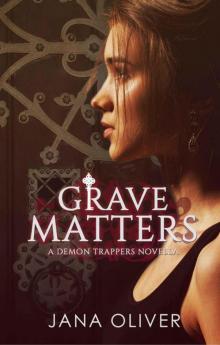 Grave Matters
Grave Matters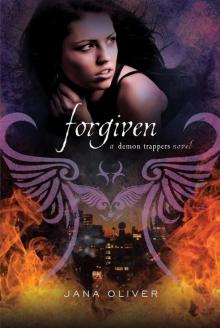 The Demon Trappers 3: Forgiven
The Demon Trappers 3: Forgiven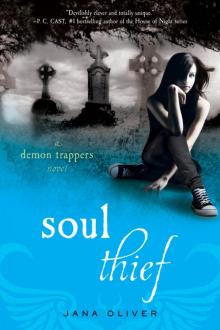 Forbidden
Forbidden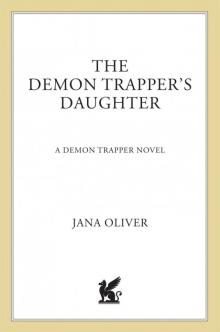 Forsaken
Forsaken Briar Rose
Briar Rose The Demon Trappers: Foretold
The Demon Trappers: Foretold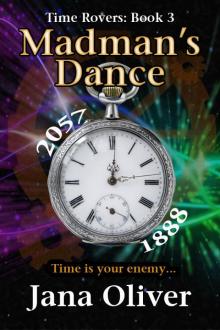 Madman's Dance (Time Rovers)
Madman's Dance (Time Rovers)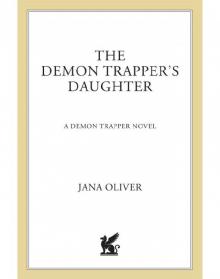 The Demon Trapper’s Daughter
The Demon Trapper’s Daughter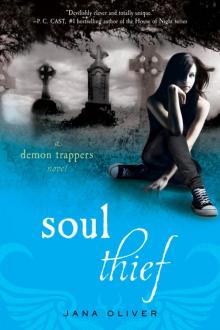 Soul Thief-Demon Trappers 2
Soul Thief-Demon Trappers 2 Mind Games (Demon Trappers Book 5)
Mind Games (Demon Trappers Book 5) The Demon Trappers: Forgiven
The Demon Trappers: Forgiven